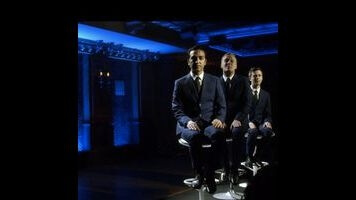John Early’s The Characters delves deep into insufferability

As The Characters’ customary opening enters John Early’s dressing room, it finds him already in character. Xscape’s swooning “Who Can I Run To?” plays on a tinny boom box and the camera pans slowly over pasted-up pictures of happy gay couples (and Anderson Cooper) before coming to rest on a terminally awkward, braces-wearing, pimply-faced teenaged Early, staring into a mirror with a look of slightly terrified hope. As with each episode of The Characters, he’s in the same position we are—who will show up? Who will John Early be?
As is this admirably free-wheeling series’ design, he’s a lot of people, including a rom-com starlet, a brash Southern housewife standup comic, a mouth-breathing bro who can’t keep his rosy thoughts of summer camp (’01) from distracting him from a first date, and, most central, an openly gay guy named John preparing for his wedding. Is John John Early? Well, for the sake of his actual friends and family, let’s hope not, but The Characters’ John is Early’s avatar in this 30-minute comic journey into the heart of self-obsession. He’s the ultimate me-first (or me-only) attention-suck, an insufferably theatrical control freak of the type that has his gathered wedding guests rolling their eyes so early and so often that you wonder how—apart from politeness, blood relation, and bad luck—they agree to be in the guy’s company in the first place. It’s a masterful quintessence of every person who demands you tell that really funny story you told him once, then says each line before you do, and corrects you for not telling it right. Every apology for interrupting carries an implicit “I just couldn’t help improving what you’re doing” and every interruption from anyone else is met with a withering glare of “how dare you.” He’s a monster, and he’s as hard to stomach as he is, in Early’s hands, impeccably portrayed.
“John Early” (the episode) is a lot like that, as Early peoples his world here with motormouthed jabber-jaws whose veneer of polite wonderfulness can’t conceal the fact that they will brook no argument to said wonderfulness nor the carefully constructed shape of their world. Early’s John demands everyone understand how perfect every aspect of his wedding dinner (and by extension himself) is, and flies into showily controlled mania as soon as, for example, he finds out that the perfect upstate inn he chose (“The artwork has a gay vibe, and that’s really exciting for the wedding and, like, human rights”) was, in fact, built by a racist who managed to disguise his slave-ownership long after abolition. Seeing that two of the three waiters are people of color, he ostentatiously “frees” them to join the party, leaving the one white server to do all the work, and he busies himself mangling the crudités for them, until he cuts his hand open. When his long, self-impressed toast is interrupted by someone daring to sip their wine, he passive-aggressively shames him (“So why would she pour unless you had sipped during the toast?”) before ceding the floor reluctantly to his eminently decent and sweet fiancee Mahan (Mahan Shirazi) whose heartfelt toast brings tears to every formerly-rolling eye at the table. Constitutionally unable to stand being upstaged, John affects a fainting spell, then continues it until his frantic mother is weeping and slapping his face in panic and his father is calling 911.
Only when assured of absolutely everyone’s attention (he sneaks a peek just to be sure) does he allow himself a vision of true happiness, a lavish, impeccably lip-synched production number of “Who Can I Run To?” with him as lead singer and Mahan and long-suffering friend Cole (Difficult People’s Cole Escola) resplendent in matching suits while every member of the wedding party watches in rapt, worshipful delight. Even there in his fantasy world, John finds fault—the blocking (momentarily) obscures his face, wedding guest Nicole (Nicole Spiezio) can’t get her pantomime horn-playing right—but, as the music builds to its crescendo, John has the spotlight. Finally.








































